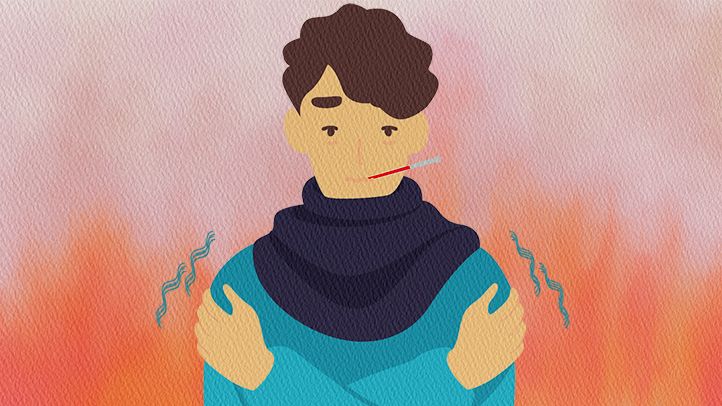Can an Ear Infection Cause a Sore Throat?
Having a sore throat is never pleasant. The pain and irritation make it hard to swallow or even talk. When a sore throat occurs along with an earache, you may wonder if the two are connected. Can an ear infection actually cause a sore throat?
The short answer is yes, an ear infection can sometimes contribute to a sore throat. Ear infections, medically known as otitis media, affect the middle ear. This is the area located just behind the eardrum. When bacteria or viruses invade this space, it leads to infection, inflammation, and buildup of fluid. The eustachian tube connects the middle ear to the back of the throat. So swelling in the ears can radiate pain into the throat as well.
Let's explore the link between ear infections and sore throats more closely. Understanding this connection will help you find the right treatment to relieve discomfort.
How Ear Infections Can Lead to a Sore Throat
There are a few ways an ear infection might end up irritating your throat as well:
- The eustachian tubes connect the middle ears and the throat. Ear infections cause congestion in these tubes, which can make your throat feel swollen and painful.
- Drinking and swallowing can become uncomfortable with an ear infection. The soreness may feel concentrated in the throat even though the main problem is in the ears.
- Some of the viruses that cause ear infections like colds and flu can also lead to sore throats. So you may be experiencing two separate symptoms of one illness.
- Draining fluid from the ears can trickle down the eustachian tubes into the throat. This can irritate the tissues.
- Ear pain often radiates to different areas like the jaw and throat. Referred pain makes an ear infection seem worse than it is.
Other Causes of a Sore Throat
While ear infections can definitely be the culprit behind a painful throat, there are other potential causes too. It's important to figure out the source of your sore throat, because the treatment will depend on the underlying problem.
Here are some other common causes of throat pain:
- Strep throat: This bacterial throat infection leads to inflammation and pain. Other strep throat symptoms include fever, swollen lymph nodes, and white patches on the tonsils.
- Common cold: Viruses like rhinovirus and coronavirus cause colds. Sore throats are often one of the first symptoms as the illness begins to take hold.
- Flu: The influenza viruses also produce sore throats in many cases. So do pain, fever, cough, runny nose, and fatigue.
- Mononucleosis: With mono, a virus causes swollen lymph tissue at the back of the throat. It's often called the "kissing disease."
- Tonsillitis: This is inflammation of the tonsils, usually due to a viral or bacterial infection. Enlarged, sore tonsils can make swallowing excruciating.
- HIV: A sore throat can be one of the first signs of an HIV infection as the virus compromises the immune system.
- Gastroesophageal reflux disease (GERD): Acid reflux can irritate the throat and vocal cords, especially after eating or at night.
- Smoking: Constant irritation from inhaling smoke can cause ongoing sore throats in smokers.
- Dry air: Without proper humidity, throats easily become dry, sore, and uncomfortable.
- Allergies: Drainage from allergic rhinitis can result in an itchy, irritated throat.
- Muscle strain: Overuse of the voice may strain throat muscles. Screaming or singing loudly can do it.
When to See a Doctor
A sore throat caused by an ear infection will normally improve once the underlying infection clears up. But when should you seek medical treatment if your throat is bothering you?
See your doctor if any of these apply:
- Your sore throat lasts longer than a week
- You have difficulty breathing or swallowing
- Your voice sounds muffled
- White spots cover the back of your throat
- Your throat is extremely red or swollen
- You have a fever over 101F (38C)
- Your lymph nodes are tender and swollen
- You have unexplained weight loss
- You have a rash in addition to a sore throat
- You've been exposed to COVID-19, mono, or strep throat
- Your symptoms worsen after a few days
Seeing your doctor promptly can help diagnose and treat a bacterial infection before complications develop. Even if it ends up being a stubborn viral infection, your doctor may have treatment suggestions to help you feel better.
Diagnosing the Cause of a Sore Throat
When you visit your doctor with a painful throat, they'll ask about your symptoms and medical history. Make sure to mention:
- When the sore throat started
- Other symptoms you're experiencing like ear pain, fever, or cough
- Existing medical issues like allergies or acid reflux
- Recent exposures to sick people
- Whether you smoke
The doctor will also conduct a physical exam to inspect your ears, nose, and throat. They may use tests to pinpoint the cause as well:
- Throat culture: A cotton swab collects a sample to test for strep bacteria.
- Blood test: A blood sample can confirm mono or show elevated white blood cells with infections.
- COVID-19 test: A nasal swab or saliva sample will indicate a coronavirus infection.
- Endoscopy: A thin, lighted tube with a camera can visualize the throat and surrounding area.
Once the doctor identifies the problem, they can provide medications and home care tips tailored to your situation.
Treating an Ear Infection-Related Sore Throat
If your sore throat stems from an ear infection, treating the infection is key. The doctor may prescribe:
- Antibiotic ear drops or oral antibiotics for a bacterial infection
- Over-the-counter pain relievers like acetaminophen or ibuprofen to ease sore throat and ear pain
- Decongestants to reduce swelling in the eustachian tubes
- Corticosteroid nasal spray if allergies or sinusitis are contributing to the problem
At home, you can manage discomfort with:
- Warm compresses over the affected ear
- Salt water gargles to soothe an irritated throat
- Throat lozenges or sprays containing benzocaine or menthol
- Drinking plenty of fluids like water, soup broth, and caffeine-free tea
- Eating soft, cool foods like popsicles or ice cream to avoid irritating an inflamed throat
- Using over-the-counter saline nasal sprays to keep the eustachian tubes clear
- Getting extra rest to support the immune system
With the right treatment, an ear infection and related sore throat usually resolve within a few days to a week. See your doctor promptly if the pain lingers longer than that.
When to Take Antibiotics for a Sore Throat
Antibiotics are only effective against bacterial infections, not for viruses. Your doctor may prescribe these medications if:
- A throat culture indicates strep throat
- You have all the signs and symptoms of a bacterial tonsillitis
- Your throat looks extremely inflamed and red
- You have difficulty swallowing liquids
- You have a fever over 101F along with throat pain
- Your swollen lymph nodes indicate an infection
- You were exposed to someone with a confirmed case of strep
Otherwise, antibiotics won't make you get better any faster. Taking them when not needed can even contribute to antibiotic resistance down the line.
Preventing Ear Infections and Sore Throats
While you can't always avoid getting sick, there are some steps you can take to lower your chances of developing ear infections and sore throats:
- Wash hands frequently with soap and water to reduce spread of viruses and bacteria
- Avoid exposure to anyone who is sick with a contagious illness when possible
- Don't smoke or use tobacco products, which irritate the throat
- Use humidifiers to keep indoor air moist, especially during cold, dry months
- Avoid overusing your voice by yelling, singing loudly, or throat clearing
- Get an annual flu vaccine to reduce your risk of influenza infections
- Don't use antibiotics unless absolutely necessary
- Treat acid reflux with medications or diet/lifestyle changes if needed
- Limit your use of alcohol, which can relax the throat muscles
If you develop frequent bouts of strep throat or ear infections, your doctor may recommend removing the tonsils (tonsillectomy) to prevent recurrent illness.
When to See an Ear, Nose and Throat (ENT) Doctor
For chronic or severe cases of sore throats and ear infections, it may help to be evaluated by an ENT specialist. These doctors focus specifically on diagnosing and treating conditions affecting the ears, nose, and throat.
See an ENT if you experience:
- More than 3-4 ear infections in a year
- Hearing loss or balance issues
- Ear pain without infection
- Fluid draining from the ears
- Ringing in the ears (tinnitus)
- Frequent sinus infections
- Problems with tonsils or adenoids
- Difficulty swallowing or opening the mouth fully
- Obstructive sleep apnea
- Growths or lumps on the neck
- Voice changes or hoarseness
- Jaw pain or clicking
An ENT specialist has specialized tools like endoscopes that can thoroughly evaluate the ears, nose, and throat. They can detect subtle problems that may be missed by other providers. ENTs can also perform surgery as needed, like removing the adenoids or inserting ear tubes.
When to Take Your Child to the Doctor
Ear infections are very common in infants and young children. This is due in part to the structure of a child's eustachian tubes, which can become clogged more easily. Kids between 6 months and 2 years old are most susceptible.
Signs your child may have an ear infection include:
- Tugging or rubbing at the ears
- Crying or fussing for no clear reason
- Trouble sleeping
- Loss of appetite or nausea
- Fever
- Drainage from the ears
- Clumsiness or balance issues
- Decreased hearing or response to sounds
Make an appointment with your child's pediatrician if they have ear pain plus another symptom like fever or drainage. Prompt antibiotic treatment can help prevent complications like speech delays, hearing loss, or meningitis.
Throat infections are also common in kids, especially between ages 5 and 15. Signs to watch for include:
- Sore throat
- Pain or trouble swallowing
- Hoarse voice
- Swollen glands in the neck
- Red, inflamed tonsils sometimes with white patches
- Fever
- Headache
- Nausea or vomiting
See the pediatrician if your child has a sore throat plus fever, swollen glands, white spots on the tonsils, or severe pain. These are clues the cause is likely strep throat or another bacterial infection requiring antibiotics.
Preventing Ear and Throat Infections in Children
You can lower your child's risk of frequent ear infections and sore throats with a few key prevention tips:
- Encourage handwashing before meals and after using the bathroom or playing outside
- Teach kids to cough or sneeze into their elbow instead of hands
- Avoid exposure to cigarette smoke, which can worsen fluid buildup
- Clean any pacifiers or bottle nipples that fall on the floor rather than putting them right back in baby's mouth
- Don't allow sick kids to share cups, utensils, or toys with others
- Ensure your child is up to date on vaccines like pneumococcal and flu shots
- Don't let kids drink while lying down, which can push fluids into the eustachian tubes
- Consider a humidifier for your child's room to ease congestion
If ear infections are severe or frequent in your child, tubes may be recommended to prevent fluid accumulation in the middle ear. Removing the adenoids is also sometimes advised to keep sinuses and eustachian tubes clear.
The Bottom Line
Ear infections can definitely contribute to an accompanying sore throat in some cases. The pain may even seem focused in the throat when the true problem lies in the ears. Look for signs of infection like ear pain, discharge, and hearing issues along with throat discomfort.
Treating the underlying infection with antibiotics and home remedies will normally resolve both issues. But see your doctor promptly if you don't get improvement within a week or if your symptoms are severe. This will ensure proper treatment and prevent potential complications from a lingering bacterial infection.
While ear infections and sore throats are somewhat inevitable, being proactive about handwashing and avoiding irritants can lower the frequency and intensity. And seeing your doctor at the first signs of infection will help you get back to feeling your best quickly.
FAQs
Can allergies or a cold cause both an ear infection and sore throat?
Yes, colds, flu, and allergies can all affect both the ears and throat. Congestion from these conditions can lead to ear infections and postnasal drip can irritate the throat causing soreness.
Why do ear infections often happen in young children?
Children's eustachian tubes are smaller and more horizontal than adult tubes. This makes it easier for fluid to build up in the ears and cause infections. Resistance to infections is also lower in young kids.
If my ear pain goes away but sore throat persists, what does that mean?
This could indicate that while the ear infection cleared, a separate condition like strep throat, tonsillitis, or mono is still bothering your throat. Seek medical treatment to determine the cause.
How can I soothe a sore throat from an ear infection at home?
Salt water gargles, throat lozenges, cold foods like popsicles, humidifiers, tea with honey, and OTC pain relievers can all provide some relief without needing antibiotics.
When should I see an ENT doctor for ear and throat issues?
See an ENT if you have chronic ear infections, difficulty swallowing, voice changes, hearing loss, recurring sore throats, or snoring/breathing issues. ENTs specialize in chronic conditions.
Disclaimer: This article is for informational purposes only and does not constitute medical advice. Always consult with a healthcare professional before starting any new treatment regimen.
Related Coverage
Experiencing hearing loss after a cold? Understand the causes, duration, and management strategies. Get insights on ear congestion, fluid buildup, and when to seek medical attention....
Sore throat and earache often stem from the same underlying illness. Learn about the most common causes of simultaneous throat and ear infections and the best treatment approaches....
Get the exact Relenza dosage for flu treatment and prevention, plus form, strength, inhaler use, safety tips, and dosing schedule....
Nasal mucus contains antibodies, moisturizes tissues, and traps pathogens - learn more about this slimy respiratory defense system with insights from mucus photos....
URIs like colds, flu and COVID-19 spread through droplets and contact. Learn how long common upper respiratory infections are contagious and how to prevent transmission....
While blankets don't directly increase core temperature, they can make you feel hotter. Learn how insulation traps heat and affects thermoregulation and fever risk....
Taking ibuprofen together with Dayquil can exceed the daily acetaminophen limit and lead to liver damage. Learn safe alternatives for cold symptom relief....
Learn about the benefits and precautions of using DayQuil and ibuprofen together to treat cold and flu symptoms. Follow dosage guidelines carefully....
Dealing with a persistent tickle or irritation in your throat? Try various home remedies and over-the-counter medications to soothe throat inflammation and irritation....
Learn whether you can safely take Advil and Dayquil simultaneously. Understand risks like organ damage and high blood pressure and follow best practices on dosing and timing....








